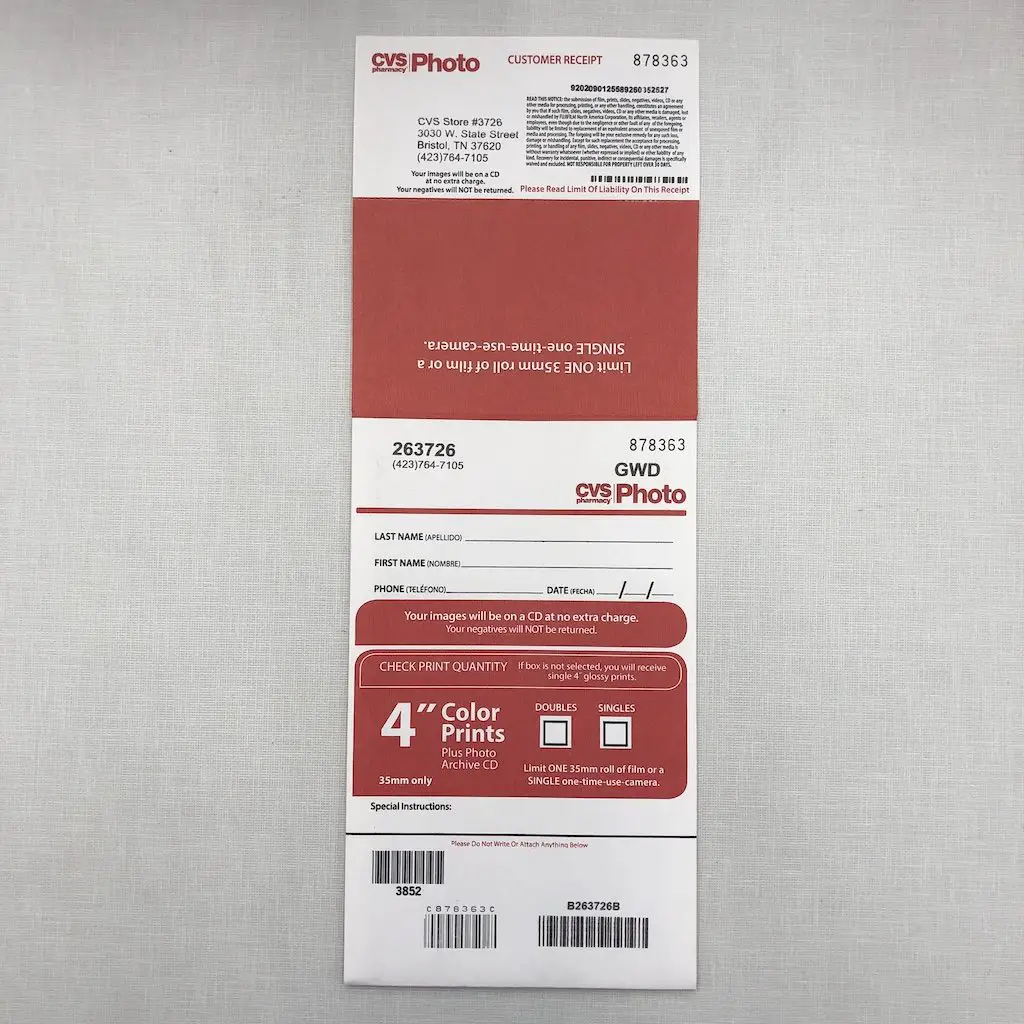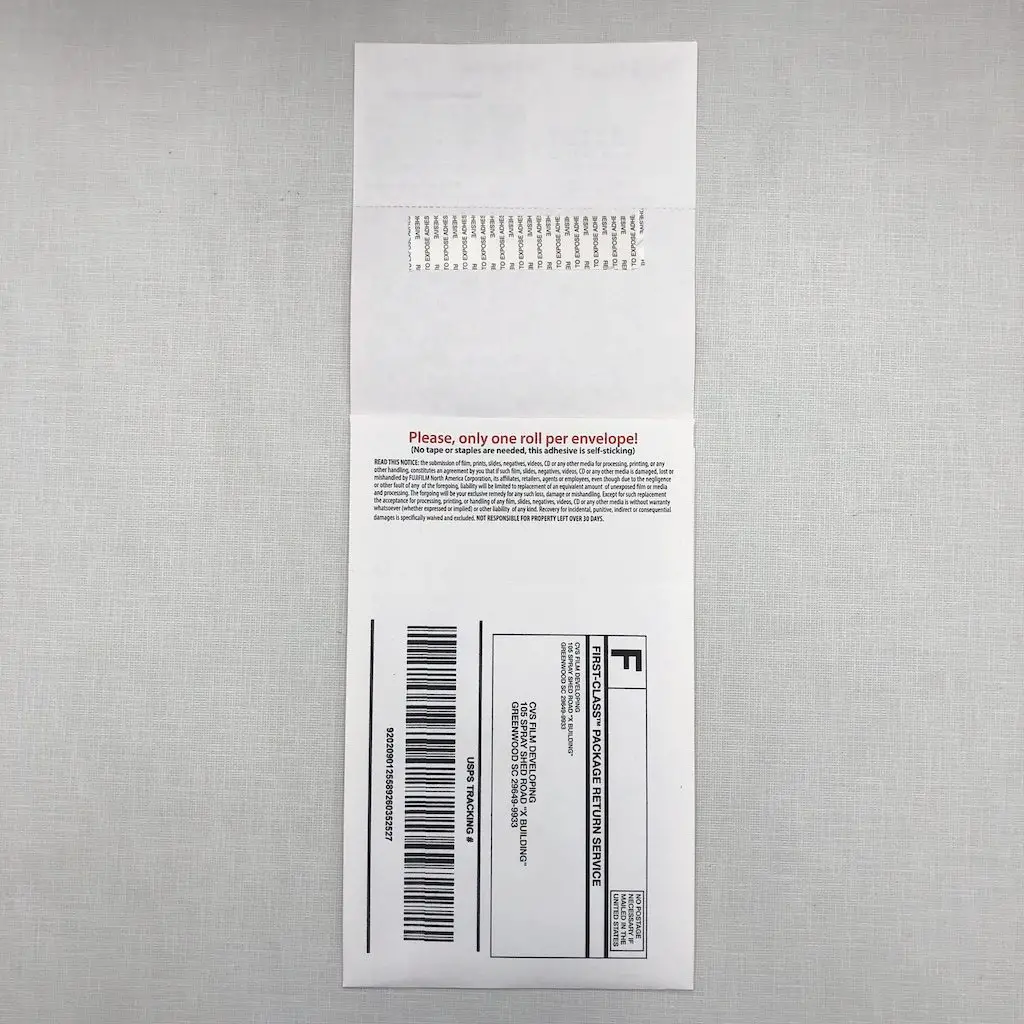Since film photography has been on the rise in popularity for the last few years, it is likely that you have some film you’ve found or taken yourself that you need developed. CVS Pharmacy is one of the few drugstores in the United States that will still develop film. However, how much they charge to develop film may be difficult to find online.
It costs between $14.42-$16.99 (plux tax) to develop a roll of 35mm color and black & white film or disposable camera at CVS Pharmacy or more. The price includes film development, a set of 4 x 6 inch glossy prints, and a free CD of your scanned negatives. However, CVS does not return your negatives.
Now that we know the price range for developing film at CVS and what it includes, see below for more specifics and what to consider when getting your a roll of 35mm film, a disposable film camera, 110mm, APS (Advantix), or slide film (E-6) developed at CVS.
2022 Update:
I have found that both CVS and Walgreens have ridiculously long processing times. I sent some film off to be processed by CVS and it took over 6 months to get it developed. I believe the biggest reason the film processing facilities that CVS send film to be developed became backed up because of lack of workers due to COVID and they have a backup of orders. If you want to get film developed and get it back within a couple weeks instead of several months, see this article I wrote about where to develop film through the mail .
.
How Much Does It Cost to Develop A Roll of Film at CVS?
To develop film at CVS it costs $14.99 for 24 exposure film and $17.99 for 36 exposure film and includes a free CD of your digitally scanned negatives and set of 4×6 inch glossy prints. This is true for both color and black & white 35mm film including disposable cameras. The price for film development at CVS lands between Walgreens and Walmart (Walmart is the least expensive while Walgreens is the most expensive
while Walgreens is the most expensive but produces better scans and prints). See the chart below for a full range of prices for developing film at CVS:
but produces better scans and prints). See the chart below for a full range of prices for developing film at CVS:
Number of Exposures | Single Set of Glossy Prints (4×6 in.) | Double Set of Glossy Prints (4×6 in.) |
|---|---|---|
12 | $10.99 | $12.99 |
24 | $14.42 | $17.85 |
27 | $14.99 | $18.99 |
36 | $16.99 | $21.99 |
35mm film with 24 exposures is more common than other exposures and it is one of the cheapest options available at CVS at $14.42 (before tax). However, many photographers like to shoot 35mm film that has a high number of exposures (such as 36) to save time and money, so the cost would be on the higher end of the price range at CVS for $16.99 (before tax).
Since CVS (like Walgreens and Walmart) do not return your negatives and the scans are not high-quality, check out this list of places to get 35mm film developed inexpensively with much better quality scans that will return your negatives.
inexpensively with much better quality scans that will return your negatives.
How much does it cost to get disposable cameras developed at CVS?
Since most disposable cameras come with 27 exposures, CVS charges $14.99 to develop a disposable camera with 27 exposures that includes single prints of glossy 4×6 inch prints and a free CD of digitally scanned negatives. This price has the price to develop disposable cameras at CVS land between Walgreens and Walmart
and Walmart for getting a disposable film camera developed at a drugstores. However, keep in mind that CVS does not return your negatives.
for getting a disposable film camera developed at a drugstores. However, keep in mind that CVS does not return your negatives.
See the list below for a full list of prices:
Number of Exposures | Single Set of Glossy Prints (4×6 in.) | Double Set of Glossy Prints (4×6 in.) |
|---|---|---|
12 | $10.99 | $12.99 |
24 | $14.42 | $17.85 |
27 | $14.99 | $18.99 |
36 | $16.99 | $21.99 |
Since CVS doesn’t return your negatives and the scans are not high-quality, see this list of places to get a disposable camera developed inexpensively with better quality scans and your negatives returned.
inexpensively with better quality scans and your negatives returned.
What Film Formats Can CVS Develop?
In addition to color 35mm film and disposable cameras loaded with color film, CVS can also develop other film formats like black & white 35mm film, slide film, APS (advantix), and 110mm film for the same price as a roll of 35mm film. Just like with developing 35mm film at CVS, the price also includes a set of 4×6 inch glossy prints, and a free CD of your digitally scanned negatives when developing other film formats.
for the same price as a roll of 35mm film. Just like with developing 35mm film at CVS, the price also includes a set of 4×6 inch glossy prints, and a free CD of your digitally scanned negatives when developing other film formats.
However, keep in mind these formats take longer to process (up to 2 – 3 weeks or more) than 35mm color film at CVS.
- Most APS (advantix) film is 24, 25, or 40 exposures on it so the cost is between $14.42 – $16.99 (plus tax).
- Most slide film (E-6) has between 24 – 36 exposures on it so the cost is between $14.42 – $16.99 (plus tax).
- 110mm film comes in between 10, 12, or 24 exposures so the cost is between $10.99 – $14.42 (plus tax).
Number of Exposures | Single Set of Glossy Prints (4×6 in.) | Double Set of Glossy Prints (4×6 in.) |
|---|---|---|
12 | $10.99 | $12.99 |
24 | $14.42 | $17.85 |
27 | $14.99 | $18.99 |
36 | $16.99 | $21.99 |
Since CVS doesn’t return your negatives and the scans are not high-quality, check out this list of places that will develop these formats inexpensively that also will return your negatives.
inexpensively that also will return your negatives.
Medium Format Film (120mm)
Unfortunately, CVS does not develop medium format film. If you are looking for a place to develop medium format (120mm) film, read this guide for where to get medium format film (120mm) developed for an inexpensive price.
for an inexpensive price.
How Do You Get Film Developed at CVS?


The good news is the process to have film developed at CVS is very easy. It involves filling out information on a paper envelope that holds your roll of film or a disposable camera (one envelope per each) and completing the following steps below:
- Bring along your exposed by undeveloped film (if you are unsure if your film is used or unused, see this guide
 ) and go to the CVS photo department at a physical location and ask for a film development envelope. Bring along your used film (if you are unsure if your film is used or unused, see this guide
) and go to the CVS photo department at a physical location and ask for a film development envelope. Bring along your used film (if you are unsure if your film is used or unused, see this guide ).
). - Fill out the order form / envelope as necessary according to your film format and the amount of prints you want
- Place your used roll of film or disposable camera inside the order form envelope and seal it. Be aware that you should only place one item per envelope so if you are developing multiple film rolls or cameras, you will need multiple envelopes.
- Drop your film (in the envelope) into the collection box in the photo department inside the CVS.
CVS will notify you by phone once your order has been processed and ready to be picked up and you’ll pay with you pick up your CD and prints. What you will receive is your 4×6 inch glossy prints and a CD with your digitally scanned negatives on it for future printing or sharing on social media.
Since most computers available now don’t have a CD-rom drive to access the images on the CD you get back from CVS, I recommend bringing along a USB flash drive to transfer the images on the CD to the USB drive at one of the photo kiosks located in CVS so you can get easily transfer them to your computer.
How long does it take to get film developed at CVS?
Depending on where you live it could take anywhere from 7 days – 4 months or more to develop your roll(s) of color 35mm film and/or disposable film camera but in my experience it takes about a week.
but in my experience it takes about a week.
However, if you develop another format like 35mm black & white film, a disposable camera loaded with black & white film, APS (Advantix), 110mm, or slide film (E-6) the processing time will be long at up to 3 weeks or more. This is because CVS (similarly to Walgreens and Walmart) doesn’t develop film onsite and sends it all to a third party developer, such as Fujifilm North America.
In Summary
CVS is a good place to develop film because of its convenient locations, good quality photo prints, and (like Walgreens) has better scans than compared to Walmart, however, like Walmart and Walgreens they do not return your film. If you do want your negatives returned and/or you care about getting more than low quality and low resolution scans, than I suggest that you read this article that lists several places to get film developed that will return negatives and give you much better scans.
that will return negatives and give you much better scans.
However, below are a list of pros and cons about getting film developed at CVS.
Pros:
- Many locations available so it is likely near you
- No shipping cost
- Can do both color and black & white 35mm film including disposable or single-use film cameras

- Can also develop other film formats like Advantix (APS), 110mm, and slide film (E-6) but locations may vary
- Free CD of scanned negatives and a set of glossy 4×6 inch prints included with development cost
- Will call you when your order is ready
- Decent quality scans but low-resolution (compared to Walmart
 )
) - Good option if you are using expired film and not sure how the negatives will turn out since it is so inexpensive (but don’t get film negatives back)
Cons:
- Long wait time of up to 6 months
- Get back low-resolution scans and prints
- Get back low quality scans
- Don’t get your negatives back
- Prints are not as good as Walgreens
- Very little, if any, customer service – drop film in a paper envelope in the store
- No online film development ordering available (must go to location)
- No bulk pricing available
- Price for development cost lands between Walgreens and Walmart
 . With Walmart being the least expensive
. With Walmart being the least expensive and Walgreens being the most expensive
and Walgreens being the most expensive .
. - Different cost to develop rolls of film with 24 exposures and 36 exposures (unlike other online development
 labs)
labs) - Will not give a discount on scanning if the roll is blank (like online labs
 )
)
